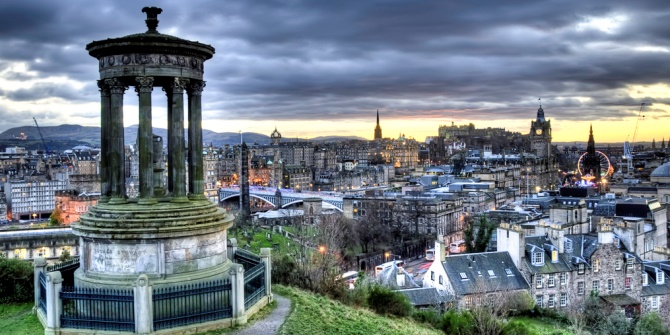In our 2015 end-of-year review, John Van Reenen predicted that Britain was heading towards Brexit. The causes of the vote, the failures of the polls, and the “Brexit-Trump syndrome” were the topics of some of our most popular articles of 2016.
The aftermath of the Brexit vote – the verdict from a derided expert
 John Van Reenen was disappointed but not surprised by the UK’s vote to Leave the EU. Whilst his own research predicts serious economic and political damage in the case of Brexit, he thought a Leave vote was a real possibility ever since David Cameron committed to a vote in 2013. In his last post as Director of LSE’s Centre for Economic Performance, he gives his verdict on the campaigns, the media, politicians, and being a derided expert.
John Van Reenen was disappointed but not surprised by the UK’s vote to Leave the EU. Whilst his own research predicts serious economic and political damage in the case of Brexit, he thought a Leave vote was a real possibility ever since David Cameron committed to a vote in 2013. In his last post as Director of LSE’s Centre for Economic Performance, he gives his verdict on the campaigns, the media, politicians, and being a derided expert.
Trump and Brexit: why it’s again NOT the economy, stupid
 As the final votes are counted, pundits and pollsters sit stunned as Donald J. Trump gets set to enter the White House. For anyone in Britain, there is a sharp tang of déjà vu in the air: this feels like the morning after the Brexit vote all over again. Eric Kaufmann explains that, as with Brexit, there’s little evidence that the vote had much to do with personal economic circumstances.
As the final votes are counted, pundits and pollsters sit stunned as Donald J. Trump gets set to enter the White House. For anyone in Britain, there is a sharp tang of déjà vu in the air: this feels like the morning after the Brexit vote all over again. Eric Kaufmann explains that, as with Brexit, there’s little evidence that the vote had much to do with personal economic circumstances.
It’s NOT the economy, stupid: Brexit as a story of personal values
 The story of the referendum is usually told through geography: areas that had been left behind by globalisation voted to Leave. But this tells us only so much, writes Eric Kaufmann. Knowing where Leave voters live does not, in itself, explain why individuals chose to vote a certain way. Here, he demonstrates the importance of invisible differences between groups, and argues that it was primarily values that motivated voters, not economic inequality.
The story of the referendum is usually told through geography: areas that had been left behind by globalisation voted to Leave. But this tells us only so much, writes Eric Kaufmann. Knowing where Leave voters live does not, in itself, explain why individuals chose to vote a certain way. Here, he demonstrates the importance of invisible differences between groups, and argues that it was primarily values that motivated voters, not economic inequality.
Hard Brexit? Only if it’s free
 Lowering immigration was the key motivation behind the Brexit vote, and how to achieve it dominates the current political debate. Drawing on new data, Eric Kaufmann analyses the propsects of support for a hard and a soft Brexit, based on how much Britons would be willing to pay to reduce the number of Europeans entering the UK.
Lowering immigration was the key motivation behind the Brexit vote, and how to achieve it dominates the current political debate. Drawing on new data, Eric Kaufmann analyses the propsects of support for a hard and a soft Brexit, based on how much Britons would be willing to pay to reduce the number of Europeans entering the UK.
Leave was always in the lead: why the polls got the referendum result wrong


 By analysing 121 opinion polls, Harold D. Clarke, Matthew Goodwin, and Paul Whiteley outline what happened with the EU referendum survey results. They explain why internet surveys performed substantially better than telephone ones – contrary to the post-2015 General Election ‘wisdom’ that telephone surveys should be preferred. Underlying trends showed that once methodological artefacts are controlled, Leave was almost certainly ahead of Remain over the entire last month of the campaign – and possibly throughout 2016.
By analysing 121 opinion polls, Harold D. Clarke, Matthew Goodwin, and Paul Whiteley outline what happened with the EU referendum survey results. They explain why internet surveys performed substantially better than telephone ones – contrary to the post-2015 General Election ‘wisdom’ that telephone surveys should be preferred. Underlying trends showed that once methodological artefacts are controlled, Leave was almost certainly ahead of Remain over the entire last month of the campaign – and possibly throughout 2016.
The Brexit-Trump Syndrome: it’s the economics, stupid

 For decades, investment has been falling, living standards have declined, and inequality has risen. What the Brexit and Trump campaigns shared was that they exploited the resulting disaffection by blaming those problems on external forces, including globalisation. Yet these problems were not the inevitable results of globalisation, but of domestic policy choices, influenced by flawed economic theories. Michael Jacobs and Mariana Mazzucato explain why and how we need to rethink contemporary capitalism.
For decades, investment has been falling, living standards have declined, and inequality has risen. What the Brexit and Trump campaigns shared was that they exploited the resulting disaffection by blaming those problems on external forces, including globalisation. Yet these problems were not the inevitable results of globalisation, but of domestic policy choices, influenced by flawed economic theories. Michael Jacobs and Mariana Mazzucato explain why and how we need to rethink contemporary capitalism.
Post-war fantasies and Brexit: the delusional view of Britain’s place in the world
 Claims about Britain’s past are made regularly in the referedum debate. But claims about Britain’s historical place in the world – courageously standing alone, being outnumbered and outgunned but in the end outperforming everyone – are not based on fact, writes Mike Finn. These myths could nonetheless have very real consequences: this is the self-image that the Brexit campaign portray and which many think they will revive by voting to Leave.
Claims about Britain’s past are made regularly in the referedum debate. But claims about Britain’s historical place in the world – courageously standing alone, being outnumbered and outgunned but in the end outperforming everyone – are not based on fact, writes Mike Finn. These myths could nonetheless have very real consequences: this is the self-image that the Brexit campaign portray and which many think they will revive by voting to Leave.
The ultimate causes of Brexit: history, culture, and geography

 Xenophobia, austerity, and dissatisfaction with politics may have contributed to the Brexit vote. But James Dennison and Noah Carl write that, although a number of concerns may have tipped the balance, Brexit was ultimately decided by more than recent events. Here, they demonstrate how the UK has been the least well-integrated EU member state, and so the closer the EU was moving toward political union, the more likely Brexit was becoming.
Xenophobia, austerity, and dissatisfaction with politics may have contributed to the Brexit vote. But James Dennison and Noah Carl write that, although a number of concerns may have tipped the balance, Brexit was ultimately decided by more than recent events. Here, they demonstrate how the UK has been the least well-integrated EU member state, and so the closer the EU was moving toward political union, the more likely Brexit was becoming.
Danny Dorling on Brexit, empire, inequality…and Eurovision.
 At a recent LSE talk, Danny Dorling argued that we should stay in the European Union. Here, he unpicks the absurdity of some of the arguments against our EU membership. Those for Brexit are not only likely to come from areas with few immigrants, but they want highly-skilled lowly-paid young Europeans out of the country, all while British expat pensioners rely on someone else’s health system. And who are the decision-makers to be? Those who got to vote in the 1975 referendum will get a second vote in this one – but 16 and 17 year-olds, who will have to build an entire life on the consequences, will not.
At a recent LSE talk, Danny Dorling argued that we should stay in the European Union. Here, he unpicks the absurdity of some of the arguments against our EU membership. Those for Brexit are not only likely to come from areas with few immigrants, but they want highly-skilled lowly-paid young Europeans out of the country, all while British expat pensioners rely on someone else’s health system. And who are the decision-makers to be? Those who got to vote in the 1975 referendum will get a second vote in this one – but 16 and 17 year-olds, who will have to build an entire life on the consequences, will not.
Brexit is not the will of the British people – it never has been
 The referendum vote for Brexit was clear: the electorate was 46,501,241 people; 17,410,742 of those voted Leave; and 16,141,241 voted Remain. The public actually did not, does not, and will not want a Brexit in the foreseeable future. Adrian Low makes this argument by analysing the post-referendum polls and demographic trends.
The referendum vote for Brexit was clear: the electorate was 46,501,241 people; 17,410,742 of those voted Leave; and 16,141,241 voted Remain. The public actually did not, does not, and will not want a Brexit in the foreseeable future. Adrian Low makes this argument by analysing the post-referendum polls and demographic trends.








The in out debate surrounding the EU misses the whole point of what is actually happening in the world and what forces are behind it.
Neo-Liberal governments have been instrumental in handing large corporations power and wealth on a scale never seen before, culminating in the total collapse of the financial markets. The drive has been to transfer wealth and power back to this tiny elite and it has been that process which has impacted on the general well being of people from all strata’s in society.
Clearly politicians have dishonestly participated in hiding the real intentions behind the Neo-Liberal agenda that is not in way concerned with the interests of ordinary people, but have followed their own self serving interests triangulating to the point where it is obvious to anyone that something is seriously wrong with the current direction of travel.
This has thrown up the age old prejudices of race, nationalism, and class war. Although that is not the whole picture it has sufficiently influenced a large minority of the voting public. The media serves the interests of the establishment because the owners of it are the establishment, the BBC has been stuffed full of tory supporting commentators and presenters and academic studies have exposed the absolute bias within it.
All of these factors ensure that people, whilst fighting among themselves, are not concerned about the minority elite which is quietly syphoning off public assets and reducing taxation to serve their interests, and taxation is the key factor that identifies the duplicity surrounding the case for fiscal probity. Whilst the rich benefit from tax cuts the real tax burden is transferred on to the rest; financing those public services that maintain a rotten status quo.
Whilst we are all arguing about the merits of which crumbs of comfort come our way, our human rights and living standards are being whittled away.
The new paradigm is obvious to anyone that understands money creation, in a world of shrinking natural resources, we can’t all trade our way out of debt or balance our trade deficits, but we can use money to directly benefit people. People are the real economy, they are the real wealth creators, a government dedicated to serving the interests of people can provide the means for a sustainable way of life, those that serve the interests of the minority are standing in the way of that. The EU solely concerned with market fundamentals and corporate interests has brought with it its own downfall. Europe has to change if it is to save itself, yet I don’t see it even looking like it recognises that.